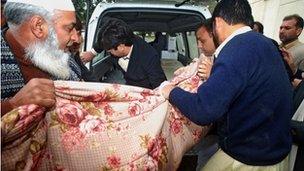Pakistan PM corruption official found dead
- Published

One of the officials investigating a corruption case in Pakistan linked to Prime Minister Raja Pervez Ashraf has been found dead.
Reports say the man, Kamran Faisal, was found hanged in the government hostel in Islamabad where he lived.
Police said it appeared he had taken his life but they were investigating all possibilities, including murder.
A relative said he did not believe he could have killed himself. A neighbour said he had been very depressed.
The Supreme Court ordered the arrest of Mr Ashraf on Tuesday over allegations he had accepted bribes when approving power generation projects as minister for water and power in 2010.
He denies the allegations.
'Very depressed'
Mr Faisal worked for Pakistan's anti-corruption watchdog, the National Accountability Bureau (NAB).
Announcing that a post mortem examination would be carried out, Islamabad police chief Bani Amin said: "We are investigating from different angles... we will establish an opinion after the autopsy."
One of the dead man's associates told the BBC the official had been under considerable stress in recent weeks.
He had played a major role in the Ashraf case until he and another officer were taken off it earlier this month by senior NAB officials, the man told the BBC.
A neighbour also said that Mr Faisal had requested a transfer from the high-profile case and had been very depressed.
But a relative, who works for the BBC, said Mr Faisal would not have taken his own life.
He was stressed, the relative said, but dedicated to his work and his family.
He was married with children, and supporting four sisters and his elderly parents.
Pressure on government
Mr Faisal's death is the latest twist in the long-running corruption case against Mr Ashraf, says the BBC's Shahzeb Jillani in Islamabad.
It comes days after the order to arrest the prime minister, which came as a populist cleric led thousands of protesters in a march and sit-in in Islamabad.
Tahirul Qadri and his supporters were demanding that the government resign ahead of elections due in May.
The government has since reached a deal with the cleric, agreeing to dissolve parliament before 16 March, but the events have raised fears of a political crisis in Pakistan.
Analysts say Mr Ashraf is unlikely to be arrested imminently.
The head of the NAB, Fasih Bokhari had refused to carry out the arrest, saying there was not enough evidence to justify it.
- Published15 January 2013
- Published23 December 2013
- Published15 January 2013